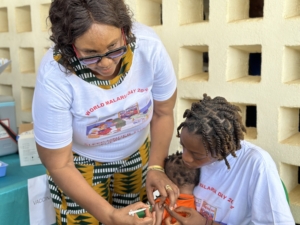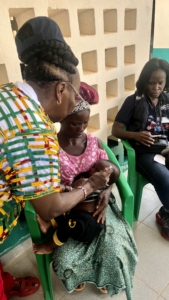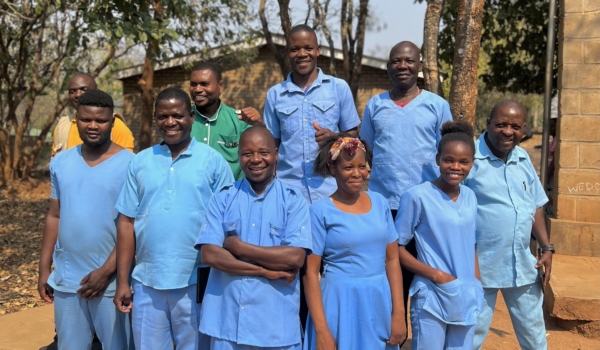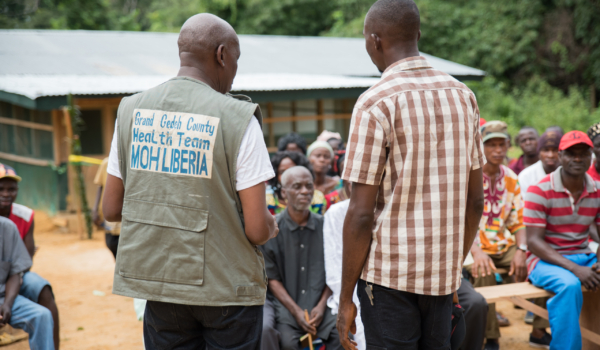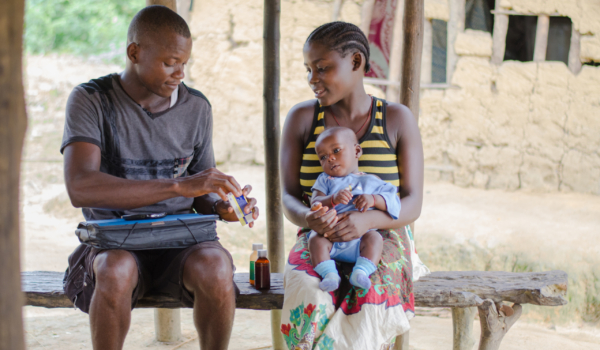In Liberia, malaria is the leading cause of death among children under five years old. This devastating problem is especially acute in rural and remote communities, where malaria’s prevalence reaches as high as 19%. Community health workers in the country’s National Community Health Program have driven progress against the treatable disease, educating families and providing diagnoses, treatment, and referrals for cases of malaria. Prevention education includes interventions such as sleeping under insecticide-treated nets and closing windows at dusk. These tactics have driven improvements in disease prevalence, but for infants and young children, serious risks remain. Now, the addition of a new national malaria vaccine campaign is changing the reality for families in Liberia’s most remote communities, and community health workers will play a critical role.
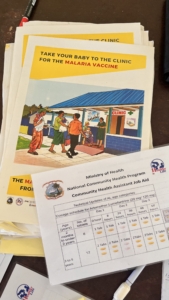
Community health worker references and community awareness materials developed for the launch of the malaria vaccine in Liberia.
On April 25, 2024, alongside partners including Last Mile Health, Liberia’s Ministry of Health marked World Malaria Day with the launch of the new RTS,S malaria vaccine, introducing it into the country’s routine childhood immunization program. Vaccination began in Rivercess County, where Last Mile Health directly manages the National Community Health Program in partnership with the Ministry of Health. Community health workers and supervisors both play key roles in ensuring the vaccine reaches rural and remote communities, with vaccine administration taking place not only at health facilities but within the community. Community health workers raise community awareness and create demand for the vaccine as well as tracking records to identify eligible children. Working from patient lists they compile, community health supervisors—typically nurses or midwives—administer the vaccines alongside other routine childhood immunizations during regular visits to communities more than five kilometers from healthcare facilities. They will track children aged five months to 15 months, ensuring that they have received all four doses before their second birthdays, and will also identify older children for “catch-up” immunization.
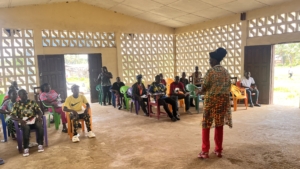
Community health workers receive training in preparation to assist with the rollout of the malaria vaccine in their communities.
Rivercess County is among six high-prevalence counties identified by the Ministry of Health for the initial introduction and rollout of the malaria vaccine. Community health workers will be key to closing the distance to care for every child in rural and remote communities. Already, community health workers diagnose 50% of confirmed malaria cases in Liberia, and provide 51% of malaria treatments amongst children under age five in rural areas. As of June 2024, 1,027 (99.4%) community health workers from communities beyond 5km of healthcare facilities and 145 (100%) community health supervisors in these counties have received training to implement the new vaccine—a strong foundation toward ensuring families can access it. “Community health workers are such a powerful resource—they start talking, and everybody comes out to listen,” explains Marion Subah, Last Mile Health’s Country Director in Liberia. “There is so much trust in the community.” This trust, Marion explains, is crucial in ensuring families will seek out the new vaccine to protect their children.
The national rollout is ambitious: by 2027, the Ministry of Health aims to achieve an 80% rate of full vaccination for children 15 months or older living in communities more than 5km from healthcare facilities. More than 500 community health supervisors will administer the malaria vaccine, supported by more than 4,500 community health workers educating communities and generating demand.
“For far too long, malaria has stolen the laughter and dreams of our children,” said Dr. Louise Kpoto, Liberia’s Minister of Health, speaking at the launch event in Rivercess County. “But today, with this vaccine and the unwavering commitment of our communities, healthcare workers and our partners, we break the chain. We have a powerful tool that will protect them from this devastating illness and related deaths, ensuring their right to health and a brighter future. Let’s end malaria in Liberia and pave the way for a healthier, more just society.”

